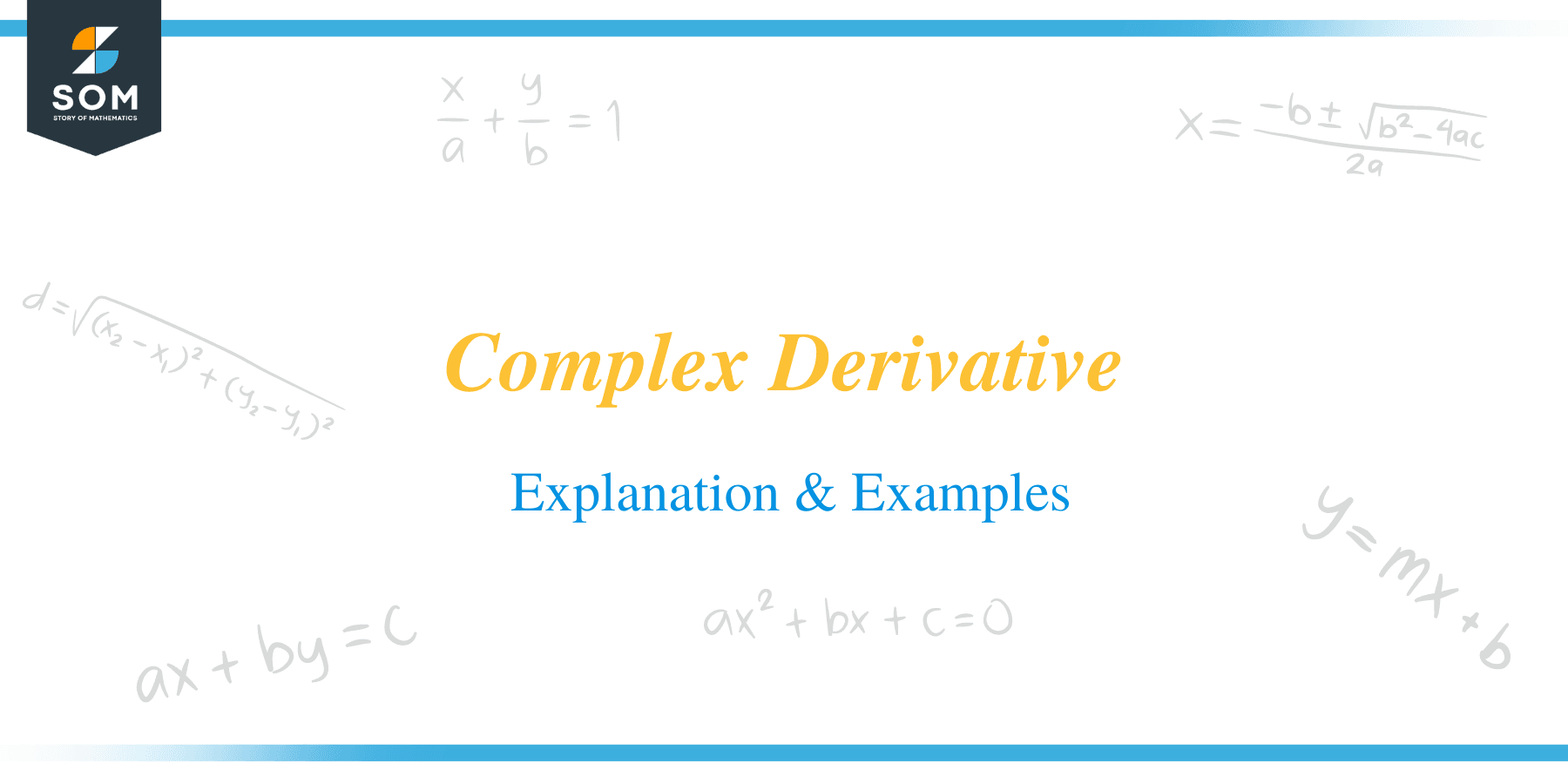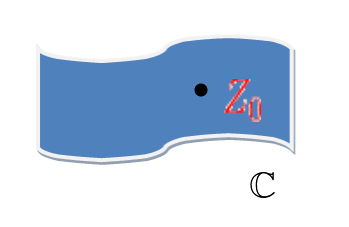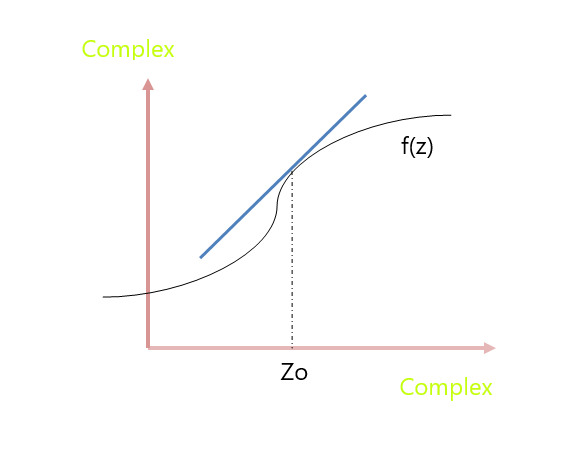JUMP TO TOPIC
 A complex derivative is a derivative that tells us about the rate of change of a complex function.
A complex derivative is a derivative that tells us about the rate of change of a complex function.
A complex function has two parts, one is a real component and the other is an imaginary component. Complex functions are mathematically represented as:
$f(z) = u (x,y) + i v (x,y)$
where $z = x+iy$, and $i=\sqrt{-1}$.
The derivative of a complex function is evaluated using the partial derivative technique if the complex function is analytic, i.e, it must satisfy the Cauchy- Riemann conditions.
In this topic, we will discuss complex derivatives, Cauchy-Riemann conditions, and how to solve different problems of complex functions.
What Is Meant by Complex Derivative?
A complex derivative is a derivative which tells us about the rate of change of a complex function. The derivative of one complex function $w = f(z) = u (x,y) + i v (x,y)$ at $z = z_{0}$ can be written as:
$\lim_{z \to \ z_{0}} \dfrac{f(z) – f(z_{0})}{z – z_{0} }$
Or we can also write it as:
$(\dfrac{dw}{dz})_{z_{0}} = \lim_{\Delta z \to \ 0} \dfrac{f(z_{0} + \Delta z) –f(z_{0})}{\Delta z}$
Remember, the point $z_{0}$ lies in the complex function C as shown below. So $z$ can approach $z_{o}$ from infinite different directions and the derivative exists if the result is the same, irrespective of the path that $z$ follows to approach $z_{o}$.

It is nearly impossible to visualize the graph for a complex derivative, but as a rough sketch, the slope for a complex function over complex y and x-axis can be shown as:

Complex Derivative Formulas
Some of the derivative formulas which are used to solve complex functions are given below.
- $\dfrac{d}{dz} k = 0$ (here, k is the constant)
- $\dfrac{d}{dz} z^{n} = n. z^{n-1}$
- $\dfrac{d}{dz} k.f(z) = k \dfrac{df}{dz}$
- $\dfrac{d}{dz} f.h = f \dfrac{dh}{dz} + h \dfrac{df}{dz}$ ( Just like Partial Differentiation)
- $\dfrac{d}{dz} (f + h) = \dfrac{df}{dz} + \dfrac{dh}{dz}$
- $\dfrac{d}{dz} (f – h) = \dfrac{df}{dz} – \dfrac{dh}{dz}$
Complex Derivative and Cauchy-Riemann Equations
A complex function is only differentiable if it reaches the same point from different paths. Suppose, for the function $w = f(z) = u (x,y) + i v (x,y)$, z can approach zero along the real axis and along the imaginary axis, and if the endpoint is not the same, then we will say that the complex function is not continuous. For a complex function to be continuous, it should verify the two Cauchy Riemann equations.
Let us first look at what happens when we go near $z_{0}$ along the real axis. We know that a complex function is given as:
$f(z) = u + iv$
When $z \to z_{0}$ from the horizontal side, then we can write z as:
$z = z_{0} + m = (x_{0} + m) + iy_{0} $, $m \in \mathbb {R}$
So we can write:
$f'(z_{0}) = \lim_{ m \to \ 0} \dfrac{f(z_{0}+ m) – f(z_{o})}{m}$
$f'(z_{0}) = \lim_{ m \to \ 0} \dfrac{f(x_{0}+ m + iy_{0}) – f(x_{o}-iy_{0})}{m}$
$f'(z_{0}) = \lim_{ m \to \ 0} [\dfrac{ u (x_{0} + m), y_{0}) – u (x_{0}, y_{0})} {m} ] + i \lim_{ m \to \ 0} [\dfrac{ v (x_{0} + m), y_{0}) – u (x_{0}, y_{0})} {m} ]$
$f'(z_{0}) = u_{x} (x_{0}, y_{0}) + i v_{x}(x_{0}, y_{0})$
Here, the partial derivatives of u and v are taken with respect to “x”.
When $z \to z_{0}$ along the imaginary axis, then we can write the equation as:
$z = z_{0} + m = x_{0} + i (y_{0} + n)$ , $n \in \mathbb {R}$
$f'(z_{0}) = \lim_{ n \to \ 0} \dfrac{f(z_{0}+ n) – f(z_{o})}{n}$
$f'(z_{0}) = \lim_{ n \to \ 0} \dfrac{f(x_{0}+ n + iy_{0}) – f(x_{o}-iy_{0})}{n}$
$f'(z_{0}) = \lim_{ n \to \ 0} [\dfrac{ v (x_{0}, y_{0} + n) – v (x_{0}, y_{0})} {n} ] – i \lim_{ n \to \ 0} [\dfrac{ u (x_{0} ,y_{0} + n) – u (x_{0}, y_{0})} {n} ]$
$f'(z_{0}) = u_{y} (x_{0}, y_{0}) – i u_{y}(x_{0}, y_{0})$
In this case, this partial derivative was taken with respect to “y”. For the complex function to be continuous, the real and imaginary parts of both paths should be equal. Hence, we can write the conditions for the differentiation of a complex function as:
$u_{x} = v_{y}$ and $u_{y} = -v_{x}$
When the conditions are satisfied, we calculate the derivative of the complex function using the formula:
$f'(z) = u_{x} + i v_{x}$
Simple Derivative and Complex Derivative
When we are differentiating a simple function f(x,y), both variables are independent of each other so we differentiate them accordingly, whereas when we are dealing with a complex function $f(z)=f(x+iy)$, we take this function as a whole.
As we saw in the previous section, for a complex function to be continuous we carry out partial differentiation, hence any changes in “x” will also lead to changes in “y” as well in terms of the slope of the function. Unless both the paths come to the same point, the complex function will not be called a differential function.
This is why the simple derivative is different from the complex derivative. Now that we have discussed complex derivatives in detail, let us study some complex derivative examples/ complex derivative problems to fully understand the concept of complex derivative(s).
Example 1: Verify whether the given complex functions are differentiable.
- $f(z) = \bar {z}$
- $f(z) = z^{2}$
Solution:
1).
We know that:
$z = x + iy$
$\bar {z} = x – iy$
$u = x$ and $v = – y$
$u_{x} = \dfrac{\delta}{\delta x} x = 1$
$u_{y} = \dfrac{\delta}{\delta y} x = 0$
$v_{x} = \dfrac{\delta}{\delta x} -y = 0$
$v_{y} = \dfrac{\delta}{\delta y} -y = -1$
Here, $u_{y} = – v_{x}$ but $u_{x} \neq v_{y}$. Hence, it is not possible to differentiate this complex function.
2).
We know that:
$z = x + iy$
$z^{2} = (x + iy)^{2} = x^{2}+ i^{2}y^{2} + i2xy = x^{2} – y^{2} + i2xy$
$u = x^{2} – y^{2}$ and $v = 2xy$
$u_{x} = \dfrac{\delta}{\delta x} (x^{2} – y^{2}) = 2x – 0 = 2x$
$u_{y} = \dfrac{\delta}{\delta y} (x^{2} – y^{2}) = 0 – 2y = -2y$
$v_{x} = \dfrac{\delta}{\delta x} 2xy = 2y$
$v_{y} = \dfrac{\delta}{\delta y} -y = 2x$
Here, $u_{y} = – v_{x}$ but $u_{x} = v_{y}$. Hence, it is a continuous complex function and it is differentiable.
Practice Questions:
- Evaluate the derivative of the complex function $f(z) = z^{3}-2z + 6$ (The function is continuous).
- Evaluate the derivative of the complex function $f(z) = (1 + 4z)^{3}$ (The function is continuous).
- Evaluate the complex derivative of $e^z$.
Answer Keys:
1).
The complex derivative of the function will be:
$f^{‘}(z) = 3z^{2} – 2$
2).
The complex derivative of the function will be:
$f^{‘}(z) = 12 (1 + 4z)^{2}$
3).
We are given a function $f(z) = e^{z}$.
We know that $z = x+iy$, so we can write the given function as:
$f(z) = e^{x+iy} = e^{x}. e^{iy} = e^{x} [cos y + i sin y]$
$f(z) = e^{x}.cosy + i e^{x} sin y$
If the function satisfies Cauchy Riemann’s two conditions, then we can determine the derivative.
$u(x,y) = e^{x}.cos y$
$v(x,y) = e^{x}.sin y$
$u_{x} = e^{x}.cos y$
$u_{y} = – e^{x}.sin y$
$v_{x} = e^{x}. sin y$
$v_{y} = e^{x}. cos y$
Here, $u_{y} = – v_{x}$ but $u_{x} = v_{y}$. Hence, it is a continuous complex function and it is differentiable.
$f'(z) = u_{x} + i v_{x}$
$f'(z) = e^{x}.cos y + i e^{x}. sin y = e^{z}$. Hence, the derivative of the function is $e^{z}$.
